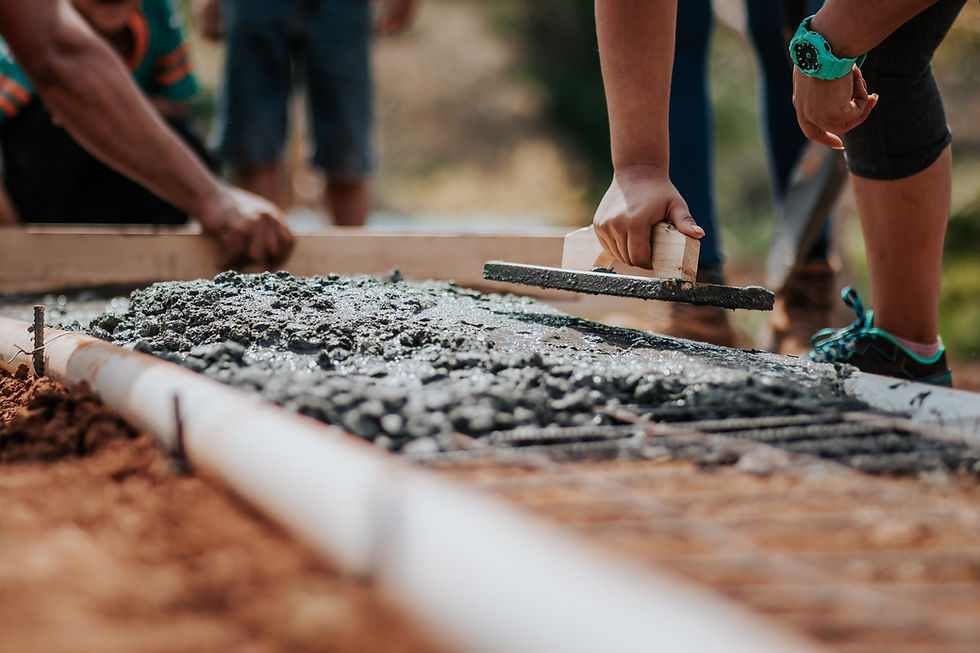How do you calculate a slab concrete? Free online estimate tool Calculator
- Dennis Asis
- Jul 22, 2024
- 3 min read
Updated: Nov 14, 2024
Ever wondered what holds up those massive skyscrapers or creates the smooth surface under your feet? It's the unsung hero of construction - concrete! But just like your favorite superhero, concrete comes in different forms, each with its own special powers.
Plain Concrete: The Strong and Silent Type

Imagine slab concrete as the quiet, dependable friend you can always rely on. It's made with a clever mix of cement (think of it as the glue), sand, and water. This combination makes plain concrete great for resisting crushing forces, like holding up a heavy weight. Think of sidewalks or building foundations – they need this kind of strength! However, plain concrete isn't the best at handling pulling forces (imagine a tug-of-war).
Reinforced Concrete: The Teamwork Makes the Dream Work!

This is where the real magic happens! Reinforced concrete takes plain concrete's strength and adds some extra muscle. Picture steel bars, like the rebar used in weightlifting, embedded inside the concrete. This creates a fantastic team effort – the concrete resists crushing, while the steel handles pulling forces. This makes reinforced concrete the champion for structures like beams, columns, and slabs that need to handle all kinds of pressure.
The Secret Ingredients: What Makes Concrete Tick?

Okay, concrete isn't alive, but it does depend on a special recipe! The main ingredients are:
Cement:
The glue that holds everything together. When mixed with water, it undergoes a cool process called "hydration," which makes it harden and bind the whole mixture.
Aggregates:
These are the rocky bits that make up the bulk of the concrete. They come in two sizes:
Coarse Aggregates:
Think of pebbles or even crushed rock. They add strength and stability, like the bones in your body.
Fine Aggregates:
Imagine tiny sand particles. These fill in the gaps between the bigger rocks and help make the concrete easier to mix and pour.

Size Does Matter!
Just like a good superhero team needs different skills, the size and mix of these rocky bits (aggregates) are crucial. Using a variety of sizes creates a denser, stronger concrete, ready for any construction challenge.
Mixing Up Success: The Art and Science of Concrete

Just like baking a delicious cake requires following a recipe, making concrete has its own set of rules. The American Concrete Institute (ACI) is like the superhero academy for concrete – they set standards to ensure it's always reliable and strong.
The Concrete Recipe: Not Just a One-Size-Fits-All!
Concrete can be customized for different jobs. Imagine a regular concrete mix being perfect for your sidewalk, while a high-strength concrete is needed for a towering skyscraper. That's why concrete mixtures are categorized based on their needs, like "normal strength concrete" for everyday jobs and "high strength concrete" for heavy-duty structures.
Ordering Concrete: It's All About Proportions! slab concrete

When ordering concrete, it's like ordering a special superhero team. You need to specify the exact ratio (like a recipe) of coarse aggregates, fine aggregates, and cement. This precise mix determines how strong and workable the final concrete will be.
The size of the coarse aggregates is especially important! Think of it as the size of their muscles – too big, and the concrete might be hard to work with; too small, and it might not be as strong.

By understanding these different aspects of concrete, you can appreciate this amazing material even more! Use this online tool to have an idea to compute for a concrete slab.
To give you an idea in terms of Concrete Mixture Class, here is a table showing the proportion for Cement: Sand: Gravel.
Use this Universal Length converter if necessary.
Note:
It is still best to consult a structural engineer. This tool serves only a supplementary and aid. Use this as your plain guide. Enjoying the tool? Support us by sending gifts donations via Paypal. Any amount in kind will be appreciated. 100% safe and secure
Disclaimer:
Our online calculator is a helpful tool to give you a general idea. We do our best to make sure the numbers are right, but we can’t guarantee they’re perfect for every situation. You should always double-check the calculator’s results and maybe talk to an expert for advice on your specific project. By using the calculator, you agree that we’re not responsible if something goes wrong based on the numbers it gives you."
Learn more related topics from our well curated reference from Amazon. Head over to our Resource Page




Comentarios